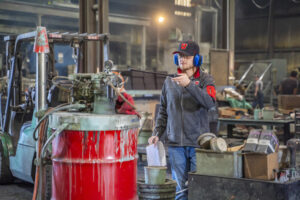The U.S. Environmental Protection Agency recently announced the selection of applications for more than $4.3 billion through the Climate Pollution Reduction Grants (CPRG): Implementation Grants General Competition (Implementation Grants) to implement community-driven solutions to the climate crisis, reduce air pollution, advance environmental justice, and accelerate America’s clean energy transition.
The Utah Department of Environmental Quality (UDEQ) was selected to receive nearly $75 million from the CPRG Implementation Grants program and will fund 13 statewide initiatives, including establishing an electric school bus pilot program, repairing pollution mitigation systems at oil and gas refineries, and subsidizing electric vehicle charging stations and residential solar panel installations. As a partner of UDEQ and its “Beehive Emission Reduction Plan,” the U’s Intermountain Industrial Assessment Center (IIAC) will receive a $3.75 million portion of those funds.

The IIAC, founded in 2016, consists of engineering faculty and students who provide free consultations with local industrial and manufacturing facilities, conducting site visits and creating analytical reports on how they can make their sites more energy efficient. It is led by Kody Powell, the John A. and Amy B. Williams Endowed Professor in the Department of Chemical Engineering, and Julie Sieving, the IIAC Co-Director.
The UDEQ’s CPRG Implementation Grant award will support expansion of the IIAC to other organizations, such as commercial, government, and educational buildings. It will allow the IIAC to partner with Kerry Kelly, associate professor in the Department of Chemical Engineering, to evaluate how energy efficiency measures will impact the emission of greenhouse gasses and key air pollutants. This will help address one of the state’s critical challenges: poor air quality.
The new funding also coincides with a recent addition to the IIAC team, Chemical Engineering Assistant Professor Deisy Fernandes. Fernandes’ research is primarily focused on 3D printing and how it can be incorporated into manufacturing processes to improve efficiency measures. She has also begun working on projects related to capturing water and environmental contaminants before they leave a manufacturing facility.
By directly examining a facility’s critical systems, such as boilers, heating and air conditioning units, and electrical wiring, team members can find opportunities to both improve efficiency and reduce costs. Such consultations can help companies achieve 10-to-20% in energy and productivity savings, which translates to a substantial reduction in greenhouse gas emissions.
“Energy efficiency is a great investment for companies. It’s something that they can save money doing, but there are also substantial air-quality benefits when investing in clean technologies,” says Powell. “Energy efficiency and air quality just go together.”
The selection of UDEQ’s Implementation Grants application is one of 25 proposals now being funded through the EPA’s Climate Pollution Reduction Grant program.
The IIAC was included as an initiative in UDEQ’s CPRG Implementation Grant proposal by meeting the UDEQ’s stringent proposal criteria, which requires applicants to demonstrate that their projects would reach a minimum threshold of greenhouse gas reduction and could immediately begin implementation.
The new funding will go to support additional faculty, students, and staff to work on the IIAC’s energy assessments program. Partnering with the U.S. Department of Energy, the program focuses on efficiency measures that can be applied to industrial, commercial, and municipal facilities, among others. Expanding into these new sectors will allow the team to consult with a greater diversity of regional businesses.
In the first eight years of the IIAC’s operation, it has consulted with more than 150 industrial, commercial, and manufacturing partners in Utah, Nevada, Colorado, Wyoming, and Idaho.
“About 60% of the strategies we recommend to companies get implemented,” Powell says, “and we’ve seen companies save up to $300,000 annually because of one of our assessments.”